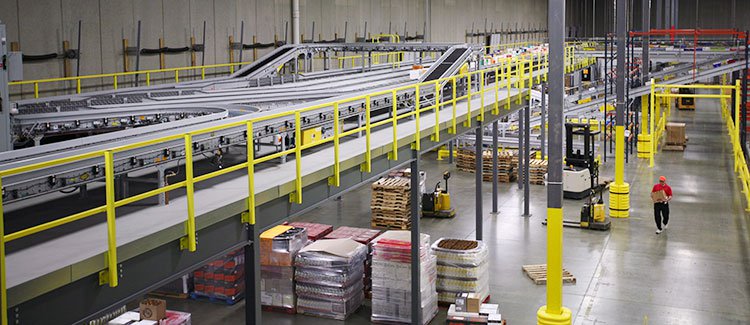
Taking Your Warehouse to Another Level (Literally!) with Elevated Platforms
Alphonso Le | 13 October 2016
You have maximized the floor space in your current warehouse as your business and demands start to grow. When looking at options to relocate to a larger facility, you may notice that the cost of moving is enormous. Instead of the headache of tearing down your facility and moving, have you considered capitalizing on your unused volume at your current location? You’re likely wondering, “How is that even possible? Didn’t we just agree the floor space is maximized?” Well, your next step, as my big city counterparts have seen, is to go up!
Bastian Solutions has great experience using elevated platforms (operator platform may be the correct terminology) to create floor space on many levels. In this article we hope to provide you with various applications and precautions to consider when, like The Jeffersons, you consider Moving on Up.
What is an Elevated Platform?
On a higher level, pun intended, a platform is a material that increases usable space within your warehouse. It is not treated as a permanent part of the building, but as an accessory to a piece of equipment or machinery. Other common names for these steel structures are equipment platform, work platform, and elevated structure.
What does an Elevated Platform Consist Of?
A standard platform consists of steel supports and cross members that hold up a deck which could vary in material based on your discretion. The different types of decking are based on various needs and requirements, such as fire safety codes and load requirements (i.e. if you were to have storage or material handling equipment under the platform). Note: it is required by fire safety codes to either have a sprinkler system below the platform or have a grating type deck that allows water to flow down from sprinklers above the platform. Besides decking, platforms will need stairs and protective railing that are usually painted safety yellow to ensure that any personnel can safely get on and off the platform. There are also several other additions/accessories such as gates for pallet loading or people loading, lifting platforms to get personnel or equipment to the top level without using stairs (though stairs are a must) and possibly different types of rails or spirals/chutes/conveyors.
What Can Platforms Be Used For?
Platforms can be used for a number of purposes. Most often, these elevated structures are used to gain easy access to machinery where operations or maintenance takes place regularly. However, Bastian Solutions often takes an innovative approach and stretches the boundaries of platforms to optimize warehouse space. Multilevel pick modules, integrated with intelligent conveyor systems, have been employed to drastically decrease footprint while increasing throughput. Sortation conveyors can also be designed to be used on platforms to allow products to go to a certain staging area. From that staging area, the footprint below the platform can be used to store palletized products ready to be shipped. Regardless of your product’s specifications, platforms can be built to accommodate your needs.
Things to Look Out For
Elevated platforms, while useful and helpful at expanding footprint, sometimes might not be the best choice. When deciding to use a platform, you must consider how much load you plan to place on the elevated structure. The typical platform will usually handle about 125 pounds per square foot. As load capacity increases, so will the price.
Another consideration you have to account for are the fees required by the city. Those fees could be things like plan check and permitting fees, fire department fees, city business license, etc. Typically, when planning to install a platform, you will be required to provide layout drawings and site plans. It is also very important to select a knowledgeable and experienced contractor/installer, as they will know what documents and equipment are required to build the platform. In the end, the important questions are:
- How much is the completed project worth?
- Who can I call to get assistance with this?
We can help find the answers to both! Feel free to contact your local rep or check our website for more information on structural solutions.
Comments
No comments have been posted to this Blog Post
Leave a Reply
Your email address will not be published.
Comment
Thank you for your comment.